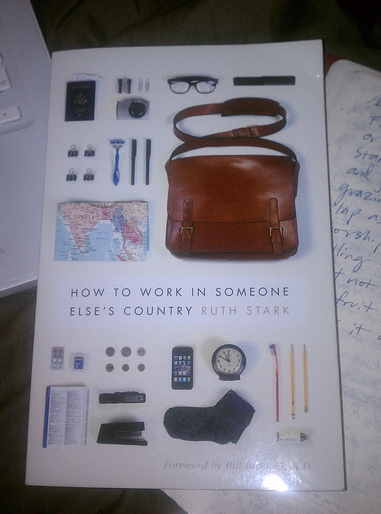How to Work in Someone Else’s Country (A Book Review)
Jan 21, 2015
Story

Do you have a colleague that just won’t shut up about the fight he’s having with his sibling over their family's vacation home? Or one who dressed way too provocatively when you were on that field visit last week? What about the person who constantly blames everything that doesn’t go their way on the incapacity or corruption of “the locals”?
We have all worked with these people. Perhaps we have even been these people at times. We didn’t know any better…until we did.
Ruth Stark writes a book to help make the learning process a bit easier. How to Work in Someone Else’s Country is a quick, engaging read. Whether you are about to embark on your first volunteer stint abroad (see Chapters 4 and 5 on packing and travel tips or Chapter 8 on making them glad you’re there), or are a seasoned aid worker with a couple of decades in the field (see or Chapter 13 on working with governments, Chapter 14 on visiting “the field”, or Chapter 18 or briefings), open it up. I’m telling you after buying it myself—there’s advice in it you probably need to hear.
In all of the ongoing discussions of aid effectiveness, this has always been the most glaring absence—the conduct of aid workers. While Stark does little to explore or explain the roots of the aid system and the inequities at its core, she does aptly describe the situations that they produce, and what she has personally found as the best ways to navigate them. To fumble is an inevitable part of working cross-culturally. To be humble is not, thus the need for a book such as this.
While the journal entries can at times seem contrived and the advice can be consultant centric, the genuineness of Stark’s advice shines through. Stark, an international health expert, writes for her daughter, also now an aid professional. She writes to articulate the values she wants her child and all aid workers and international do-gooders to embody. How you behave, how you treat people—it matters.
We spend so much time on the hard skills, making sure everyone has the right technical knowledge and training. The so-called “soft skills”—relationship building, emotional intelligence, listening, facilitation, leadership, etc.—are assumed to already be in place. It’s a fatal mistake that we in the aid industry continue to make. I don’t presume to know the solution. What I do know is that bad behavior can be a much more serious impediment to progress than lack of a functional logframe.
Stark described the book as one she had been “threatening to write for 20 years.” I, for one, am glad she did it. It may even make a great “gift” for that colleague with some learning to do.
***
This post originally appeared at: http://www.how-matters.org/2012/03/04/how-to-work-in-someone-elses-country/
***
Related Posts
The elephant hasn’t left the room: Racism, power & international aid
Confessions of a Recovering Neocolonialist




